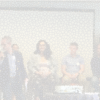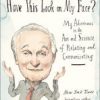[vc_row css=”.vc_custom_1476853192870{margin-top: 0px !important;margin-bottom: 0px !important;border-top-width: 0px !important;border-bottom-width: 0px !important;padding-top: 0px !important;padding-bottom: 0px !important;}”][vc_column][vc_column_text]
OFFICE CLERK (Bea Arthur): Name and occupation…
COMICUS (Mel Brooks): Comicus. Stand-up philosopher.
I coalesce the vapor of human experience into a viable and logical comprehension.
OFFICE CLERK: Oh. A bullshit artist.
—History of the World
[/vc_column_text][/vc_column][/vc_row][vc_row css=”.vc_custom_1476853239323{margin-top: 0px !important;border-top-width: 0px !important;padding-top: 0px !important;}”][vc_column][vc_separator][vc_column_text]Comedy can indeed be a cover for b.s. But it is also one of the most powerful ways to connect with others. (SnapChat is the other.) More than anything I studied as a business major in undergrad or in law school, or my jobs at research companies, or the minimal formal moderator/QRC training I’ve had, my experience writing and performing stand-up, improv and sketch comedy is my most valuable asset as a researcher. (For those of you in Nitpickers Anonymous, no, I don’t write improv…and no, there’s no hyphen in “nitpicker”…nose-picker, yes; nitpicker, no.)
Like any good art form, comedy is about observation and reflection — taking the world around us that we so often take for granted — and looking at it in a new way. With comedy, it’s a way that makes us laugh. To wit (one of my favorite pretentious expressions I learned in law school, but since here it actually pertains to wit, I’ll use it), George Carlin’s observation: “What is tennis but ping-pong where the players stand on the table.”
Comedy is also about connecting things that weren’t connected before. Robin Williams was masterful at this, drawing from an incredibly broad and deep well of knowledge and cultural reference points and spontaneously linking them in a frenzy of warp-speed brilliance.
Comedy, like research, is based on empathy and perspective.
As a comedian, I harness everything I’ve learned about human behavior over my nearly 45 years and look at the world from the perspectives of my audience. I ask myself, “What are they thinking? Where are they coming from? Where can I get great coffee around here? (I get distracted easily.) What do we have in common that I can latch onto so that I can carry them with me? What will they find incongruous, ironic, paradoxical, ridiculous, hyperbolic – i.e., funny?” There is a tremendous degree of analysis that occurs, but it occurs instantaneously and almost subconsciously. Basically, I try to coalesce the vapor of human experience into a viable and logical comprehension. (Hmm, that Mel Brooks may be onto something.)
Comedy puts people at ease, especially at the beginning of a focus group. It razes the walls some people erect to protect or distance themselves, and shows them that it’s a safe environment in which to explore. Of course, it has to be managed so it doesn’t spin out of control. (I will whip out the Comedy Whoop-Ass and gently yet assertively put someone in their place if they try to commandeer the group.) Having studied the masters like Bill Cosby, Billy Crystal and Ellen DeGeneres, I know where the line is.
Comedy makes me seem less high-maintenance than I actually am; strengthens my relationships with clients, recruiters, facilities and partners; and is integral to the success of the ideation sessions I run called, “Out of Focus Groups™.”
Not everyone feels comfortable trying to be funny, nor should they try to be. I’m sure we’ve all experienced the vicarious pain of watching someone who tries to be funny but isn’t…not that that’s ever happened to ME! (Tongue almost cemented in cheek. Hey, you don’t get hits if you don’t swing.)
It’s much more important to have a good sense of humor than to be funny oneself. Having a good sense of humor is about being open to different perspectives and understanding how and why other people find certain things funny. It helps elucidate how they see the world, which helps explains their attitudes and behaviors. In laughter are research insights. Are we open enough to see them?
How can we all incorporate more comedy into our lives and our work? Here are a few suggestions, which also apply to being more creative generally and have been said by many others before me:
- Think like a child. Be curious. Recapture that sense of wonder and fascination with everything.
- Become a polymath. And realize that word has nothing to do with math (at least not specifically).
- Go beyond your comfort zone.
- Don’t take anything for granted.
- Improvise. Do NOT deliver canned jokes (unless you like the sound of crickets).
- Be like improv actors and jazz musicians, who “offer” things to each other to riff off of (that’s a lot of ending F’s and two prepositions at the end of a sentence, I know). Run with it and see where it takes you. Also know when to rein it in.
- Look at things differently from the way you normally do. Physically turn them — or yourself — upside down or sideways or diagonally. Take it apart, reassemble it.
- Pat your tummy and rub your head — and imagine what that feels like from the perspective of your tummy and your head.
- Let your guard down and laugh…a lot. You’ll soon start to feel the vapor coalescing.
(a version of this piece, called “Coalescing Vapor: Taking a Comedic Perspective,” originally appeared in the November 2014 issue ofQuick Tips on the QRCA website)[/vc_column_text][/vc_column][/vc_row]

 Back to the blog
Back to the blog Subscribe
Subscribe



 Twitter
Twitter